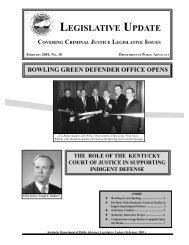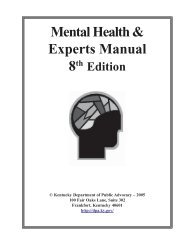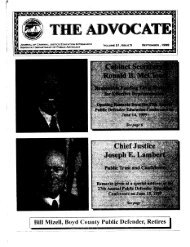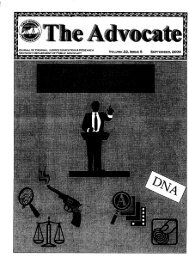May 2002 - Department of Public Advocacy
May 2002 - Department of Public Advocacy
May 2002 - Department of Public Advocacy
Create successful ePaper yourself
Turn your PDF publications into a flip-book with our unique Google optimized e-Paper software.
Continued from page 47<br />
by written request, or in an “emergency” by telephone. Id. at<br />
(1). “The committee member to whom the request is directed<br />
shall attempt to promptly furnish the requestor with a telephonic<br />
answer and written informal letter opinion as to the<br />
propriety <strong>of</strong> the act or course <strong>of</strong> conduct in question.” Id.<br />
SCR 3.530 comes complete with protections. Section (3) <strong>of</strong><br />
the rule states that “… no attorney shall be disciplined for<br />
any pr<strong>of</strong>essional act on his part performed in compliance<br />
with an opinion furnished to him on his petition [request],<br />
provided his petition clearly, fairly, accurately and completely<br />
states his contemplated pr<strong>of</strong>essional act.”<br />
Recently, I spoke with an Ethics Hotline Committee member<br />
in Lexington, Kentucky, Mr. Robert Turley, Esq., about seeking<br />
an informal opinion from an Ethics Hotline Committee<br />
member. Mr. Turley advises that, when seeking advice and<br />
protection under SCR 3.530 from the Ethics Hotline Committee<br />
member, the lawyer should “begin with full disclosure <strong>of</strong><br />
the facts and circumstances <strong>of</strong> the situation.” Then, “if the<br />
lawyer follows the advice [given, he or she receives protection]<br />
in relation to the ethics implications.” The opinion rendered<br />
in these circumstances is an informal opinion. It is not<br />
published, and, in fact, it is “confidential” under SCR 3.530(7).<br />
(SCR 3.530(2), (4), (5), and (6) outline the procedure publishing<br />
formal ethics opinions and for challenging their publication.)<br />
If you need to contact a Hotline Ethics Committee Member in<br />
your area, you can call the Kentucky Bar Center in Frankfort<br />
at (502) 564- 3795. The folks there will help you find a member<br />
in your area. As Mr. Turley says: “The Supreme Court adopted<br />
the rule in order to encourage lawyers who have questions<br />
about a proposed action.” Mr. Turley also told me that these<br />
confidential “Hotline responses get filed with the Executive<br />
Director <strong>of</strong> the Kentucky Bar Association and the Chair <strong>of</strong><br />
the Ethics Committee.”<br />
DPA Responses To Inquiries About Client Suicide Threats<br />
Last fall, I spoke with several DPA lawyers about the subject<br />
<strong>of</strong> client suicide threats. The following statement by the <strong>Public</strong><br />
Advocate, Ernie Lewis, sums up the consensus opinion<br />
that I found:<br />
I do believe it is the lawyer’s obligation and duty to<br />
tell authorities when he/she has good reason to believe<br />
that the client is suicidal. Often this comes in the<br />
form <strong>of</strong> a simple statement by the client. In such situations<br />
it is imperative to talk with the client about the<br />
statement, and to let them know that you feel obligated<br />
to let someone know about this so that an evaluation<br />
can be done, so that a watch can be initiated,<br />
and other steps taken. In fact, I view the communication<br />
by the client as a cry for help. The client who<br />
THE ADVOCATE Volume 24, No. 3 <strong>May</strong> <strong>2002</strong><br />
does not communicate the intention frightens me more<br />
than the one who does.<br />
I agree that a lawyer has a heightened responsibility<br />
when a child is involved. Children have more dramatic<br />
mood swings. Their suicidal gestures can be<br />
quite real and tragic in consequence, and intervention<br />
is essential. At the same time, adult clients should not<br />
be ignored, as they too may utter to their lawyer the<br />
last statement about their intention.<br />
How to judge when the client has gone so far as to<br />
require letting someone know is difficult. I believe the<br />
lawyer is always conducting a type <strong>of</strong> clinical assessment.<br />
I think the lawyer develops over time the ability<br />
to spot certain words and other behaviors that result<br />
in a conclusion that the client is serious about intending<br />
to commit suicide.<br />
The last paragraph in Ernie Lewis’ statement gives us all a<br />
moment <strong>of</strong> pause. Ernie Lewis and all the other DPA lawyers<br />
who spoke with me about this subject would err on the side<br />
<strong>of</strong> caution when this subject presents itself in a client meeting<br />
or other setting. In Kentucky, we have the privilege and<br />
responsibility to fine-tune the rheostat, think it through, and<br />
help the client who intimates suicidal thoughts to their lawyer.<br />
Some jurisdictions might require disclosure when the<br />
lawyer encounters this serious situation. [See for instance<br />
Virginia state “Opinion 560” (4/10/84).]<br />
Conclusion<br />
Our laws favor protection <strong>of</strong> the client when we have reasonable<br />
fears about the client’s possible self-destructive behavior.<br />
DPA tradition follows that line <strong>of</strong> thinking. Some <strong>of</strong> our<br />
challenges in this area are to fight the temptation to turn the<br />
light switch on or <strong>of</strong>f with a difficult client and instead choose<br />
to thoughtfully tune the rheostat by exercising our best judgement<br />
while continuing to serve the most and needy client.<br />
Thanks go to Ben Cowgill, KBA Chief Bar Counsel, Robert<br />
Turley, KBA Ethics Hotline Committee Member, Ernie Lewis,<br />
Dennis Stutsman, Rebecca Ballard DiLoreto, Tom Glover,<br />
Steve Mirkin, Rob Riley, and Gail Robinson.<br />
Tim Shull<br />
Assistant <strong>Public</strong> Advocate<br />
100 Fair Oaks Lane, Suite 302<br />
Frankfort, KY 40601<br />
Tel: (502) 564-8006; Fax: (502) 564-7890<br />
E-mail: tshull@mail.pa.state.ky.us<br />
48








